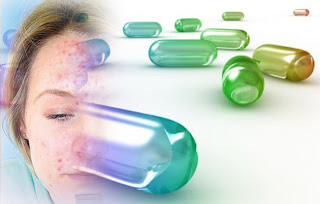 Several Acne Vitamins like vitamin A, B-Complex, C, D, E, K and minerals like zinc, chromium and selenium play an important role in maintaining healthy skin tissues. They also contribute in acne prevention and heeling acne faster. This is because these vitamins are powerful antioxidants that clear the pores by flushing toxins and free radicals outside the body. Some even have antibacterial properties which help in healing the damaged skin tissues by promoting immunity. Deficiency of these vitamins and minerals can cause acne. Thus, it is recommended to have 3-5 servings of different fruits and vegetables to obtain all essential vitamins and minerals for a healthy and acne free skin. Some facts about essential Acne Vitamins and Minerals are listed below.
Several Acne Vitamins like vitamin A, B-Complex, C, D, E, K and minerals like zinc, chromium and selenium play an important role in maintaining healthy skin tissues. They also contribute in acne prevention and heeling acne faster. This is because these vitamins are powerful antioxidants that clear the pores by flushing toxins and free radicals outside the body. Some even have antibacterial properties which help in healing the damaged skin tissues by promoting immunity. Deficiency of these vitamins and minerals can cause acne. Thus, it is recommended to have 3-5 servings of different fruits and vegetables to obtain all essential vitamins and minerals for a healthy and acne free skin. Some facts about essential Acne Vitamins and Minerals are listed below.1) Vitamin A:

 Vitamin A is a fat soluble vitamin that exists in different forms. Vitamin A obtained from animal sources is called Retinol while its provitamin obtained from plant sources is called Beta-Carotene.
Vitamin A is a fat soluble vitamin that exists in different forms. Vitamin A obtained from animal sources is called Retinol while its provitamin obtained from plant sources is called Beta-Carotene.Dermatological Functions:
Vitamin A is important in maintaining healthy skin. It strengthens the protective tissue of the skin and mucus membrane. It prevents the formation of acne by reducing sebum production. 13-cis retinoic acid, a form of vitamin A is effectively used in the treatment of acne. Vitamin A being a powerful antioxidant helps to clear the pores by flushing toxins and free radicals outside the body.
Recommended Daily Intake of Vitamin A:
 The above chart lists the RDA for different age groups. However, the recommended dosage of vitamin A in order to fight acne is 8,000 IU per day but if you are pregnant do not take more than 5000 IU per day.
The above chart lists the RDA for different age groups. However, the recommended dosage of vitamin A in order to fight acne is 8,000 IU per day but if you are pregnant do not take more than 5000 IU per day.Dietary Sources of Vitamin A:


The best plant sources of Vitamin A or carotene are yellow and dark green leafy vegetables and fruits like spinach, amaranth, broccoli, carrots, pumpkin, mango, papaya, apricots, yams etc. The best animal sources of vitamin A or retinol are liver, kidney, egg yolk, milk, butter, cheese, fish liver oils etc.
Deficiency Effects:
Deficiency of vitamin A makes the skin rough and dry. It leads to keratinization of skin tissues which can increase bacterial infection and ultimately leads to the formation of acne.
Overconsumption Effects:
High doses of Vitamin A can also cause pimples. The side effects include skin irritation, itchiness, dryness, redness and puffiness. It is also important to note that overconsumption of vitamin A can be dangerous during pregnancy.
2) B-Complex Vitamins:
Several water soluble B-complex Vitamins like Vitamin B1 (Thiamine), Vitamin B2 (Riboflavin), Vitamin B3 (Niacin), Vitamin B5 (Pantothenic Acid) and Vitamin B6 (Pyridoxine) play an important role in maintaining healthy skin tone. They also contribute in the prevention of stress acne by reducing internal stressors like tension, anxiety, worry and anger since many studies proves stress as an important factor in aggravating and maintaining acne. It is also recommended to eat a variety of fruits and vegetables to obtain all the essential B-Complex Vitamins as these vitamins work together in a group. Some facts about essential B-Complex Vitamins are listed below.
I) Vitamin B1 (Thiamine):


Dermatological Functions:
Vitamin B1 is important for energy production and assists in proper digestion during the process of food metabolism. A proper balance of this vitamin helps the body in the absorption of other vitamins. It is also known to enhance the process of blood circulation. Vitamin B1 being a powerful antioxidant helps to clear the pores by flushing toxins and free radicals outside the body.
Recommended Daily Intake of Vitamin B1:
 The recommended dosage of Thiamine in order to fight acne is 10 mg 3 times per day.
The recommended dosage of Thiamine in order to fight acne is 10 mg 3 times per day.Dietary Sources of Thiamine:
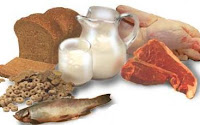 The best sources of Vitamin B1 or Thiamine are yeast, cereals, pulses, brown rice, flax seeds, oil seeds, nuts, asparagus, cauliflower, potatoes, orange, pork, liver, eggs, milk etc.
The best sources of Vitamin B1 or Thiamine are yeast, cereals, pulses, brown rice, flax seeds, oil seeds, nuts, asparagus, cauliflower, potatoes, orange, pork, liver, eggs, milk etc.Deficiency Effects:
Deficiency of Thiamine can lead to weakness, constipation and edema.
II) Vitamin B2 (Riboflavin):

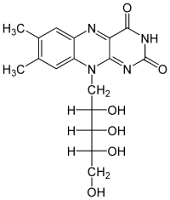
Dermatological Functions:
Vitamin B2 is essential for the maintenance of healthy skin, hair and nails. It works along with B1 to improve and maintain the mucus membranes in the digestive tract and thus assists in proper digestion and energy production.
Recommended Daily Intake of Vitamin B2:
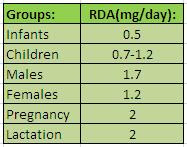 The recommended dosage of Riboflavin in order to fight acne is 10 mg 3 times per day.
The recommended dosage of Riboflavin in order to fight acne is 10 mg 3 times per day.Dietary Sources of Riboflavin:
The best sources of Riboflavin are milk and milk products, meat, eggs, liver, cereals, fruits, vegetables and fish.
Deficiency Effects:
Deficiency of Riboflavin can cause different types of Acne.
III) Vitamin B3 (Niacin):


Dermatological Functions:
Vitamin B3 is important for a healthy skin as it enhances the process of blood circulation. It helps in the metabolism of carbohydrates, fats and proteins. It helps to flush the toxins out of the cell.
Recommended Daily Intake of Vitamin B3:
 The recommended dosage of Niacin in order to fight acne is 100 mg 3 times per day.
The recommended dosage of Niacin in order to fight acne is 100 mg 3 times per day.Dietary Sources of Niacin:
The best sources of Niacin are liver, yeast, whole grains, cereals, pulses like beans and peanuts, milk, fish, eggs and vegetables.
Deficiency Effects:
Deficiency of Niacin can also cause different types of Acne.
IV) Vitamin B5 (Pantothenic Acid):

Dermatological Functions:
Vitamin B5 is popular for reducing stress and acne relief. It is also important for the proper functioning of the adrenal glands. It plays a vital role in the production of Coenzyme A which is important for the metabolism of skin oils.
Recommended Daily Intake of Vitamin B5:
 The recommended dosage of Pantothenic acid in order to fight acne is 50 mg 3 times per day.
The recommended dosage of Pantothenic acid in order to fight acne is 50 mg 3 times per day.Dietary Sources of Pantothenic Acid:
The best sources of Pantothenic acid are egg, liver, meat, yeast, milk, fruits and vegetables.
Deficiency Effects:
Deficiency of Pantothenic acid can be a cause of stress acne and hormonal acne.
V) Vitamin B6 (Pyridoxine):


Dermatological Functions:
Vitamin B6 is important in the metabolism of proteins, sugars and fatty acids. It is also important in maintaining a healthy immune system and producing antibodies.
Recommended Daily Intake of Vitamin B6:
 The recommended dosage of Pyridoxine in order to fight acne is 50 mg 3 times per day.
The recommended dosage of Pyridoxine in order to fight acne is 50 mg 3 times per day.Dietary Sources of Pyridoxine:
The best sources of Pyridoxine are egg yolk, fish, milk, meat, wheat, corn, cabbage, roots and tubers.
3) Vitamin C (Ascorbic Acid):


Dermatological Functions:
Vitamin C is very important for growth and repair of skin tissues and thus directly helps in maintaining healthy skin. Vitamin C being an antioxidant protects against infection and enhances immunity. Along with bioflavonoids Vitamin C can have an antibacterial effect in fighting acne. It speeds up the absorption of certain minerals like iron and thus speeds up in the process of healing acne.
Recommended Daily Intake of Vitamin C:
 The recommended dosage of vitamin c in order to fight acne is 300 mg 3 times per day but if you are suffering from diabetes it is recommended to consult the physician about the proper dosage of vitamin c.
The recommended dosage of vitamin c in order to fight acne is 300 mg 3 times per day but if you are suffering from diabetes it is recommended to consult the physician about the proper dosage of vitamin c.Dietary Sources of Vitamin C:


The best sources of vitamin c are all citrus fruits like orange, gooseberry, guava, plum, Kiwi, lemon and green vegetables like cabbage, spinach, tomatoes and potatoes. Milk is a poor source of Vitamin C or Ascorbic acid.
Deficiency Effects:
Deficiency of vitamin c can increase the chance of a skin infection. It can also slow down the process of healing acne.
4) Vitamin E:
Vitamin E is a fat soluble vitamin that exists in 8 different forms.


Dermatological Functions:
Vitamin E is a naturally occurring antioxidant that enhances the acne healing process and tissue repair. It also protects the skin from being damaged by excess UV radiation. It prevents the cell damage by preventing the oxidation of polyunsaturated fats. It also protects the body from damage by free radicals.
Recommended Daily Intake of Vitamin E:
 The recommended dosage of vitamin E in order to fight acne is 400 IU per day.
The recommended dosage of vitamin E in order to fight acne is 400 IU per day.Dietary Sources of Vitamin E:
 The best sources of vitamin E are wheat germ oil, cotton seed oil, peanut oil, corn oil, sunflower oil, meat, milk, butter and eggs.
The best sources of vitamin E are wheat germ oil, cotton seed oil, peanut oil, corn oil, sunflower oil, meat, milk, butter and eggs.5) Vitamin K:


Dermatological Functions:
Vitamin K is essential for the production of blood clotting factors and the repair of broken capillaries. It speeds up the healing process. It helps in repairing the skin that has been damaged by dryness or discoloration due to acne. It is very popular for its anti-aging ability to remove fine lines, spider veins and dark circles under the eyes.
Recommended Daily Intake of Vitamin K:
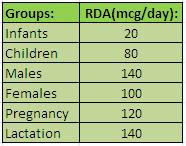
Dietary Sources of Vitamin K:
 The best sources of vitamin k are green leafy vegetables like spinach, cabbage, cauliflower, broccoli, tomatoes and alfa alfa. It is also present in egg yolk, meat, liver, cheese and other dairy products.
The best sources of vitamin k are green leafy vegetables like spinach, cabbage, cauliflower, broccoli, tomatoes and alfa alfa. It is also present in egg yolk, meat, liver, cheese and other dairy products.Deficiency Effects:
The persons with the deficiency of vitamin k would take a longer time to repair the skin that is damaged due to acne. Another visible deficiency effects are spider veins and dark circles under the eyes.
Overconsumption Effects:
High doses of vitamin K produce hemolytic anemia due to increased breakdown of RBC.
6) Zinc:
Dermatological Functions:
Zinc prevents acne by regulating the activity of sebum production by sebaceous glands. Zinc promotes a healthy immune system, helps in wound healing and prevents scarring. It is also an antioxidant which helps to clear the pores by flushing toxins and free radicals outside the body.
Recommended Daily Intake of Zinc:
 The recommended dosage of Zinc in order to fight acne is 20 mg per day.
The recommended dosage of Zinc in order to fight acne is 20 mg per day.Dietary Sources of Zinc:
 The best sources of zinc are oysters, liver, beef, wheat, cheese, shrimp, egg, milk and fruits
The best sources of zinc are oysters, liver, beef, wheat, cheese, shrimp, egg, milk and fruitsDeficiency Effects:
The deficiency of zinc can be one of the causes of formation of varied types of acne.
Overconsumption Effects:
High doses of zinc can cause severe stomach pains as zinc is a heavy metal.
7) Chromium:
Dermatological Functions:
Chromium fights against acne by reducing skin infections.
Recommended Daily Intake of Chromium:
The recommended dosage of chromium in order to fight acne is 150 mcg per day.
Dietary Sources of Chromium:
Chromium is not easily absorbed from food sources and moreover high quantities of sugar in the diet causes a loss of chromium from the body. Thus, in order to get adequate amount of chromium in the diet, it should be taken in the supplemental form called as chromium picolinate or chromium polyicotinate.
8) Selenium:
Selenium aids skin elasticity and helps in acne relief by diminishing skin inflammation. It is an antioxidant that inhibits the oxidation of fats and protects vitamin E. Selenium is required in trace amounts by the body. Generally selenium deficiency is not seen in healthy individuals but high doses of selenium of about 400 mg/day are highly toxic.
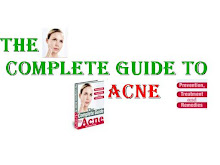
15 comments:
Try natural method to cure acne skin. I think we can visit ProvenCureAcne.Com to get more informative and naturall method cure acne skin without using drugs
Tips are nice and they will help as Best Acne Treatment.
ttoo many supplements are not v good for health
Fat Reduction
Very informative post. I can tell that the author spends considerable time to gather those useful information. Eating the right foods together with the proper
acne treatment can help alleviate acne condition.
This all sounds fabulous, but most acne troubles are related to hormones. You can wash and scrub and moisturize and spot treat if you want a acne prone skin, but if your hormones are out of whack then good luck!
Regular vitamins and apple cider vinegar work best for me.acne mark treatments.I use it as a topical, I use 1 part apple cider vinegar and 1 part water.
I looked up all kind of remedies and research. I'd like some tips on getting rid of acne scaring. I have some on my back and I hate it.acne treatment system. Have anyone out there had success with getting rid of acne scarring and if so how long did it take bleaching creams etc. that actually work or have been proven successful?
I have lots of pimples, like big ones and tiny ones on my cheeks. house acne treatments. Is there a way to get rid of them?
What a pain. Acne. I hate it. I feel very sad when I look at my picture. I've had acne for more than four years now. I have treated it for a long time, but I don't see any difference. I'm hoping that one day, I will be free from it. genuine acne treatment
Are there any home remedies that will get rid of these acne in two weeks or less. Or are there any cheap yet effective products? Thank you :) genital pimples
There are foods that have been known to cause acne. Among them would be foods that are very high in fat, beverages and sweets with a high amount of caffeine, dairy, and, yes, sugar. Was it not previously mentioned sugar does not cause acne?
Sugar does not automatically cause acne in everyone. In some cases, sugar may cause acne but it is not always the root cause of acne. The same could be said of dairy, fat or processed foods. The key issue here would be to start taking a closer look at all your diet choices when you suffer from acne.
Generally, the food choices you eat can be deemed anything less than healthy should be cut out of your diet. Your acne breakout could be the result of simply having a horrible diet or the diet could be contributing to worsening an acne condition. learning healthcareguru here
interesting article about acne cure, what do you think about Curcumin as acne cure?
For more information about Dermatologists in hauz khas
And finally, a reminder to EXERCISE must be shouted from the gym floor! No matter what nutritional approach you take, ALL of the experts recommend that you exercise on a regular basis. Best vitamins for brain and memory
Nicely written--This post is equally informative as well as interesting.Thank you for information you been putting on making your site such an interesting blog ..
best dermatologist in madurai
Post a Comment